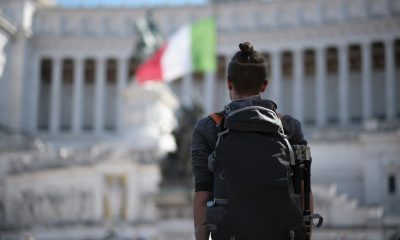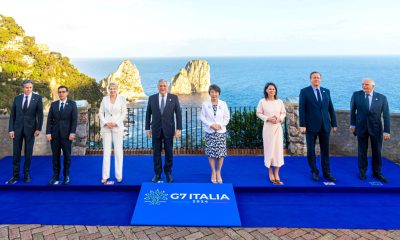Iran
Iran-europenii cer o descurajare mai puternică a Teheranului înainte de întâlnirea secretarului Blinken cu aliații NATO și liderii europeni la Bruxelles

The UK-based Alliance for Public Awareness, an umbrella organization representing numerous Iranian expatriate communities from across Europe, urged European leaders ahead of scheduled meetings of the US Secretary of State with European leaders and Foreign Ministers from NATO member states later this week. The anticipated topics of discussion are manifold but are sure to include recent developments in Iranian affairs and the fledging Iran nuclear deal, or the Joint Comprehensive Plan of Action (JCPOA).
The letter by APA was primarily addressed to European Commission President Ursula von der Leyen. US Secretary of State Antony Blinken, Belgian Foreign Minister Sophie Wilmès, and European Union foreign policy chief Josep Borrell each received a copy of the letter, as well. Borrell, Blinken, and von der Leyen are scheduled to have their own trilateral meeting, separate from the others, while the top American diplomat is still in Brussels.
Since Joe Biden was elected US president, numerous commentators have anticipated a close cooperation between the US and its European allies with regard to various issues, including the JCPOA. While the APA’s letter welcomed the prospect of greater Trans-Atlantic collaboration over Iran policy, it strongly cautioned against any appeasement of the theocratic regime ruling Iran. It also expressed serious concern about discussions of Iran policy being too narrowly focused on the nuclear deal, to the exclusion of other issues that have arguably become more urgent in recent months.
Since taking office, President Biden has repeatedly signaled his willingness to return the US to JCPOA and drop the associated economic sanctions, but he has also insisted that the Islamic Republic take the first step by reversing its numerous violations of the agreement. Biden has also suggested that once the JCPOA is revived, his administration will pursue a broader agreement that addresses issues such as Iran’s ballistic missile development, its interventions in the surrounding region, and its support of international terrorism.
The APA letter suggested that the latter issue has been inexcusably neglected by Western policy, especially in the wake of the Belgian court case which established guilt for a high-ranking Iranian diplomat and three other operatives in a plot to set off explosives at a gathering of Iranian expatriates near Paris. “This conspiracy could have been one of the bloodiest terrorist events in European history,” the letter underscored after criticizing the European Union and its member states for their failure to meaningfully address the sentence or to take “appropriate practical measures.”
Previous statements from other non-profit groups have conveyed specific recommendations for such measures and have received signatures from dozens of European members of parliament and former government ministers. In many cases, these included the downgrade or severance of diplomatic and trade relations, with any further interactions along those lines being contingent upon Iran making a firm and enforceable commitment to halting terrorist and surveillance activity in Europe. Some statements have also referred to the worsening conditions inside the Islamic Republic and have suggested that similar European pressure should be used to curtail the suppression of political dissent and pro-democratic advocacy.
The APA letter added, “We call on you to hold the Mullahs' regime accountable for its state-sponsored terrorism, widespread human rights abuses, ballistic missiles program, as well as attempts to acquire nuclear weapons,” noting that if Iran does not submit to an agreement that plausibly ends terrorist activity, “we expect Europe to cut ties with the regime and close its embassies, which are espionage and terror centers.”
This description of the embassies was based in part on the fact that Assadi, the primary defendant in the Belgian terrorism case, was working as third counsellor at the Iranian embassy in Vienna at the time of his July 2018 arrest. He evidently used the position to smuggle explosives for the operation into Europe using a diplomatic pouch before handing them off to two other operatives at a meeting in Luxembourg. The would-be bombers reportedly represent only a small part of a much larger network that Assadi calculated during his time on European soil.
When Assadi was arrested in Germany, he was in possession of a diary and a number of other documents that identified members of that network and indicated he had provided a number of them with cash payments for unspecified services. His records also included details about a number of points of interest spanning much of Europe, including cultural and religious centers that had previously come under suspicion from Western intelligence services for ties with terrorism.
The APA has taken the position that this information should be more widely known, and in more detail. As such, its letter urged the publication of “all content, documents, names, and addresses obtained from Assadollah Assadi, which indicate a widespread spy and terrorist network in Europe.”
The letter conveyed a familiar criticism of Western policy and media, namely that by remaining silent on some issues and giving excessive attention to others, policymakers and reports have “encouraged the Iranian regime in its repressive and rogue policies.” Many statements on the Assadi case explicitly argued that the 2018 terror plot was an example of this phenomenon, coming at a time when US-European discord over the JCPOA was just reaching its peak.
While public discussion of that issue was commonplace at the time, comparatively little attention was given to anti-government protests that had broken out across the Islamic Republic at the end of 2017, much less to the government repression that forced that activism back underground sometime in January 2018. The leading coalition of Iranian opposition groups, the National Council of Resistance of Iran, estimates that 60 participants in that uprising were killed, several of whom were tortured to death, while thousands of others were arrested.
Critics of Western policy stress that ignoring this crackdown may have reinforced the Iranian regime’s sense of impunity. Many of those critics therefore worry about the potential impact on global security if more recent and more alarming incidents are similarly sidelined in favor of efforts to preserve the JCPOA. One such incident is the 2018 terror plot, which targeted an event attended not only by tens of thousands of Iranian expatriates but also hundreds of their political supporters including lawmakers from Europe, the US, and much of the world. Another is the regime’s crackdown on a subsequent nationwide uprising, which was even larger than its predecessor.
In November 2019, citizens of nearly 200 Iranian cities and towns took part in protests that condemned the entire theocratic regime after government officials announced a hike to gasoline prices. Authorities immediately responded by opening fire on crowds with live ammunition, killing an estimated 1,500. Thousands of others were arrested, and Amnesty International later issued a report detailing the widespread torture they were subjected to for months afterward.
The APA attributed this sort of repression, as well as foreign terrorism, to “previous concessions” and insisted to European leaders, “The only way [to prevent more of this] is to be decisive against the blackmail policy of the Iranian regime. The mullahs retreat when they see determination.”
Trimiteți acest articol:
-

 Tutunzile în urmă 4
Tutunzile în urmă 4De ce politica UE privind controlul tutunului nu funcționează
-

 China-UEzile în urmă 4
China-UEzile în urmă 4Împreună-ți mâinile pentru a construi o comunitate de viitor comun și pentru a crea un viitor mai luminos pentru parteneriatul global de cooperare prietenoasă între China și Belgia
-

 Comisia Europeanăzile în urmă 4
Comisia Europeanăzile în urmă 4Mișcarea nu este chiar liberă oferită Regatului Unit pentru studenți și tinerii lucrători
-

 Organizația Națiunilor Unitezile în urmă 5
Organizația Națiunilor Unitezile în urmă 5Declarația de la Oslo creează noi provocări pentru dezvoltarea oamenilor
























